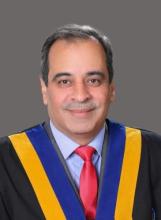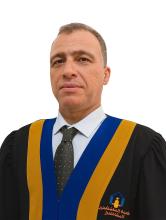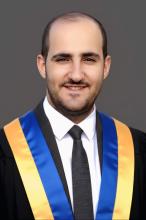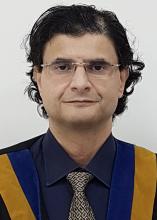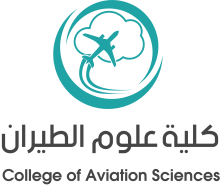The Aircraft Maintenance Department was established in the 2017/2018 academic year. It offers the following unique and pioneering programs:
1. Bachelor's Program in Aircraft Maintenance (B1.1): The first program of its kind in the Arab world to award a bachelor's degree. This 137-credit hour program was launched in the 2017-2018 academic year.
2. Bachelor's Program in Avionics (B2): A 137-credit hour program that commenced in the 2022-2023 academic year. It stands as the first and only avionics bachelor's specialization in the Arab world.
3. Bachelor's Program in Aviation Management: A newly introduced 132-credit hour program, launched in the 2025-2026 academic year. This is the first program of its kind in the Kingdom.
The Jordanian Higher Education authorities accredit all programs.
Highly qualified faculty members recruited from prestigious universities worldwide staff the department. They possess profound practical, research, and professional expertise in the fields of aircraft maintenance, avionics, and aviation management.
The department's faculty and administration are committed to continuously reviewing and updating curricula and teaching methodologies in compliance with quality assurance standards. We actively foster ongoing relationships with specialized companies and institutions to facilitate applied research and project collaboration. Furthermore, in partnership with the Mideast Aviation Academy (MAA), the department ensures a practical training environment that enhances students' professional and technical competencies. This equips our graduates with the specialized knowledge needed to seamlessly transition into careers within the aviation industry.
The department prioritizes participation in relevant conferences and workshops, which enables us to integrate the latest advancements in aviation sciences into our ongoing curriculum development. We attract a growing number of students from within Jordan and abroad. A key distinction of our department is its focus on preparing students to obtain international aircraft maintenance licenses, such as those from the European Union Aviation Safety Agency (EASA Part-66) and the Jordanian Civil Aviation Regulatory Commission (JCARC).
In line with Amman Arab University's pursuit of international accreditations and licenses for all its specializations, the Faculty of Aviation Sciences has recently achieved a significant milestone: it has been accredited and licensed by EASA as a Part-147 Training Organization and as an examination center for both the Aircraft Maintenance (B1.1) and Avionics (B2) programs. This accomplishment, achieved in collaboration with the Middle East Aviation Academy, follows the full satisfaction of all European accreditation requirements.
Moreover, the Faculty of Aviation Sciences at Amman Arab University has earned accreditation from the Aviation Accreditation Board International (AABI)—the first in the Arab world and the eighth globally—for a five-year term until the end of 2030. This prestigious recognition was awarded after the Faculty successfully met the rigorous quality standards of this renowned, U.S.-based accreditation body, the only one of its kind in the aviation field.
Dr. Ahmad Alhosban
Acting Head of Aircraft Maintenance Department
The Avionics BSc Program was established in the academic year 2022/2023 with a 137 academic hours and local accreditation from the Jordanian Higher Education Authorities. The Avionics BSc Program provides qualified faculty members from the most prestigious universities in the world. The teaching and administrative staff in the program continuously review and update the curricula and teaching methods in accordance with the quality control standards. The program seeks to communicate continuously with the companies and institutions concerned in order to accomplish projects and applied research. Beside that the curricula is designed in a way that aims to raise the professional and technical competence of students and gain knowledge in the field of specialization, which qualifies the student to work in the relevant companies after graduation easily.
The curricula has been built to provide community with qualified specialists, competent enough to keep abreast with the latest development in avionics sciences combining theory and practice.
Students who graduates from the Avionics will demonstrate understanding of basic science involved in aircraft maintenance activities, theory of operation of aircraft engines and systems. Student will gain the ability to understand written maintenance report and write the appropriate paper work needed by regulatory bodies for aircraft maintenance, also students will get knowledge of regulatory and legal issues impact avionics beside the ability to test, inspect, maintain, repair and troubleshoot faults in aircraft systems and engines.
Graduates of the program should be able to apply their knowledge in a practical manner using detailed procedures and manufacturer’s instructions.
In light of the efforts of the administration of Amman Arab University to obtain international accreditations and licenses for all its specializations, the College of Aviation Sciences has recently obtained the accreditation and licensing of the European Aviation Safety Agency (EASA) as a training body and a center for conducting EASA exams, this achievement was for both the aircraft maintenance program (B1), the avionics program (B2), and as (Part-147). After achieving all accreditation requirements for aircraft maintenance and avionics sciences.
Recently, the College of Aviation Sciences at Amman Arab University has obtained the membership of the AABI: Aviation Accreditation Board International, as the first in the Arab world and the sixth in the world, the college was accredited as a training institute – educator member of the Council in the field of aviation sciences in the aircraft maintenance bachelor’s program offered by the college since 2018. This achievement was obtained after the college met the expectations of a wide range of quality standards related to the strategic management of resources, the interactions of faculty members and students in the educational process, and the achievement of learning goals to obtain an internationally accredited degree.
Vision
Excellence in the areas of teaching and learning in aircraft maintenance sciences and scientific research locally and regionally.
Mission
Preparing distinguished staff in the field of aircraft maintenance sciences equipped with the knowledge, skills and ethics of the profession, to meet the needs of the local and regional community, in accordance with local and international quality criteria.
Program Mission (Bachelor’s Program - Avionics Sciences):
Providing an advanced and high-quality academic program in the fields of aviation electronics sciences and their applications.
Educational Program Objectives (Bachelor’s Program - Avionics Sciences):
- Learning the basic and modern principles in the field of electrical and electronic systems, and automated control systems related to aviation.
- Familiarizing with various aircraft systems including electrical, hydraulic, and electronic systems.
- Applying maintenance skills for electrical, electronic, and automated control systems according to regulations and instructions, with a focus on teamwork.
- Analyzing faults in the electrical, electronic, and automated control systems in the aircraft.
- Evaluating malfunctions in electrical, electronic, and automated control systems in aircraft.
- Writing technical reports required by regulatory bodies for aviation electronics maintenance.
Educational Program Outcomes (Bachelor’s Program - Avionics Sciences ):
The expected outcomes of this program are preparing graduates competent in:
- To learn the basic and modern sciences in the field of aviation electronics.
- To understand how all aviation electronics system’s function.
- To apply maintenance skills for aviation electrical and electronic systems, along with teamwork skills.
- To analyze technical problems related to the electrical, electronic, and automated control systems of the aircraft.
- To evaluate technical issues related to the maintenance and design of aviation electronic systems.
- To write appropriate technical reports required by regulatory bodies and manufacturers for aviation electronics maintenance.
Mapping of Program Educational Objectives (PEO's) with Students Outcomes (SO's)
Program Educational Objectives (PEOs)
- Learning the basic and modern principles in the field of electrical and electronic systems, and automated control systems related to aviation.
- Familiarizing with various aircraft systems including electrical, hydraulic, and electronic systems.
- Applying maintenance skills for electrical, electronic, and automated control systems according to regulations and instructions, with a focus on teamwork.
- Analyzing faults in the electrical, electronic, and automated control systems in the aircraft.
- Evaluating malfunctions in electrical, electronic, and automated control systems in aircraft.
- Writing technical reports required by regulatory bodies for aviation electronics maintenance.
Students Outcomes (SOs)
- To learn the basic and modern sciences in the field of aviation electronics.
- To understand how all aviation electronics system’s function.
- To apply maintenance skills for aviation electrical and electronic systems, along with teamwork skills.
- To analyze technical problems related to the electrical, electronic, and automated control systems of the aircraft.
- To evaluate technical issues related to the maintenance and design of aviation electronic systems.
- To write appropriate technical reports required by regulatory bodies and manufacturers for aviation electronics maintenance.
Mapping between PEOs and SOs:
| PEOs | SOs |
| Learning the basic and modern principles in the field of electrical and electronic systems, and automated control systems related to aviation. | To learn the basic and modern sciences in the field of aviation electronics. |
| Familiarizing with various aircraft systems including electrical, hydraulic, and electronic systems. | To understand how all aviation electronics systems function. |
| Applying maintenance skills for electrical, electronic, and automated control systems according to regulations and instructions, with a focus on teamwork. | To apply maintenance skills for aviation electrical and electronic systems, along with teamwork skills. |
| Analyzing faults in the electrical, electronic, and automated control systems in the aircraft. | To analyze technical problems related to the electrical, electronic, and automated control systems of the aircraft. |
| Evaluating malfunctions in electrical, electronic, and automated control systems in aircraft. | To evaluate technical issues related to the maintenance and design of aviation electronic systems. |
| Writing technical reports required by regulatory bodies for aviation electronics maintenance. | To write appropriate technical reports required by regulatory bodies and manufacturers for aviation electronics maintenance. |
| Student Achievement Data | Download |
